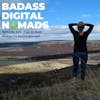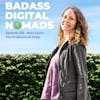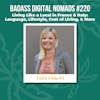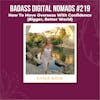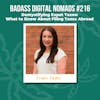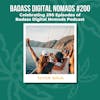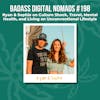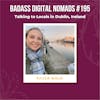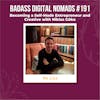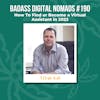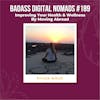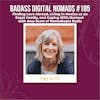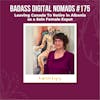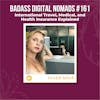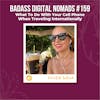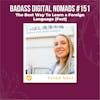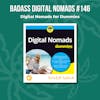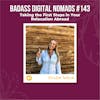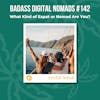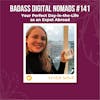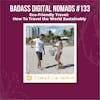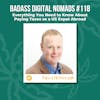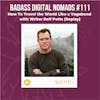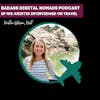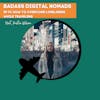How to Work Remotely from Iceland for Six Months
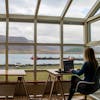
Pros and Cons of Living and Working in Iceland
What if you had six months to explore Iceland - all while being insanely productive at work? Now, you can with Iceland's new long-stay visa and work permit for digital nomads and remote workers.
The Iceland remote work visa is open to citizens of all nationalities. In this podcast, Kristin explains how to qualify for the visa, what the requirements are, and the pros and cons of living in Iceland as an expat or digital nomad.
Plus, get insight into what it's like to live at a co-working and co-working space in the remote West Fjords of Iceland.
Show sponsor: Get 10% off your entire order plus free shipping over $99 at www.thehemphaus.com with promo code TWK10.
EPISODE RESOURCES AND SHOW NOTES
- Video: Work Remotely from Iceland
- Learn more about Iceland's Remote Work Visa: https://work.iceland.is/
- Apply here: https://utl.is/images/L-801_Long-term_visa-07.pdf
RELATED PODCAST EPISODES:
.......................................................................................................
WORK WITH KRISTIN:
- Book a private consultation
- Relocate abroad with Orbis Relocation or Poker Refugees
Support the Badass Digital Nomads Podcast:
- Become a Patron for $5 per month
- Leave a 5* Review: https://lovethepodcast.com/digitalnomad
- Leave a voice message
- Submit a question or recommend a guest (feedback survey)
- Buy new Badass Digital Nomads Merch (Teespring.com/Stores/TravelingwithKristin)
Connect on Social Media:
- Follow on Instagram
- Subscribe to Traveling with Kristin on YouTube
- Subscribe to Digital Nomad TV on YouTube
- Join the Badass Digital Nomads Facebook Group
Podcast descriptions may contain affiliate links of products and services we use and recommend at no additional cost to you.
Introduction: Welcome to Badass Digital Nomads, where we're pushing the boundaries of remote work and travel, all while staying grounded with a little bit of old school philosophy, self-development, and business advice from our guests.
Kristin: 00:00:22 So here's a crazy example of the Digital Nomad Butterfly effect for you. So in early 2018, I met Johnny FD from Nomad Summit. While I was checking into my hostel in Spain before departing on the Nomad Cruise, Johnny and I became pretty good friends. We traveled to Bulgaria together and he later invited me to speak at Nomad Summit Las Vegas. While speaking at Nomad Summit Las Vegas, I met a fellow digital nomad, Grace Taylor from Canada, who is a digital nomad living in Ireland. We became good friends and she ended up coming on my podcast to speak about digital nomad taxes for US citizens. We also decided to travel to Tomorrowland Winter together, which was a music festival in France back in 2019 in the French Alps, whereby we met a really cool group of entrepreneurs from Kansas City and we actually shared a chalet with them and we skied and listened to music and had a great time during that week at Tomorrowland Winter.
Kristin: 00:01:45 And one of the guys, Zach, was the owner of an online store called The Hemp House that sells CBD products. And we became good friends. I ended up stealing his products <laugh>, like the whole time I was taking his CBD oil. He had all of these face oils and face lotions and a face mask and CBD supplements, and I basically just dipped into his stash and well, he let me <laugh>. But today I have a gift for you guys from that crazy chain of events. And if you are looking for some Black Friday deals or Cyber Monday deals, you can now get 10% off of any of the products at thehemphouse.com using the code TWK10. So you can get 10% off anything site-wide, and you can get free shipping on all orders over $99. There are supplements, tinctures, soft gels, vaping products, beauty products, different types of beautiful products like the Star Bubba Kush CBD hemp flower <laugh>.
Kristin: 00:03:03 I'm sure you'll find something for you on there. That's at the Hemp Haus, H-E-M-P-H-A-U-S.com and use code TWK10 for 10% off site-wide and free shipping right now over $99 during the holiday season.
Kristin: Hi everyone, Kristin from Traveling with Kristin here and welcome to episode 83 of Badass Digital Nomads. And today we're talking about Iceland's new remote work visa. Iceland is one of a slew of countries that has now offered a form of a digital nomad visa. So if you caught episode 77 about digital nomad visas and the pros and cons of each one, this is a follow-up to that episode. So I'm going to tell you who can qualify for Iceland's remote work permit, what you need to apply, how long you can stay in the country, and all of the other things that you need to know about it. I'll also share a little bit about my personal experience living and working in Iceland at the Blue Bank, which is a co-working and co-living space slash startup incubator in the very remote West fjords of Iceland in a tiny, tiny town.
Kristin: 00:04:28 Barely 300 people living there. So that was a really cool experience. But before we get into that, I would just like to thank Frederick from Sweden for leaving a five star review on Apple podcasts. He says remote work inspiration, Badass Digital Nomads is a great podcast for professionals on the move. Thank you, Frederick, and thanks to everyone out there listening, sharing, and leaving reviews for the podcast. I really appreciate it. So, all right, A digital nomad visa in Iceland. In the late October of 2020, the Icelandic government announced plans for its first ever remote work visa and it is open to citizens of any country around the world who wants to live and work in Iceland as long as you are self-employed or work for a non Icelandic company. So even if your country is currently restricted from travel to Europe during the Coronavirus Pandemic, you can still apply for this remote work visa and stay there for up to 180 days with a very likely possibility that they will offer an extension option sometime in 2021.
Kristin: 00:05:52 So without this visa, first of all, if you're from the US or Canada, for example, you can't even go to Iceland right now. But for the few countries that are allowed to visit Iceland for tourism, you can only stay for up to 90 days as part of your Schengen visa. Or of course if you're a European citizen, you can stay there full time, but before the pandemic, the longest you could stay in Iceland was 90 days in total throughout all the Schengen country. So this visa will give you the opportunity to either stay in Iceland for 180 days or to go there for 90 days and then go to, um, mainland Europe for 90 days. And so that basically doubles the length of your Schengen visa. So this visa isn't for everyone as you're about to learn, but it is for some people. So here are the details.
Kristin: 00:06:47 To qualify for this visa, you're going to need to check five boxes. The first thing is, as I mentioned, you need to be either a self-employed remote worker or online entrepreneur freelancer or have a job with a foreign company. And this is so that you aren't a risk for taking jobs from locals in the country. So you're going to need to show proof of employment, um, or proof that you own an online business, and you can apply as a single person, a couple or a family. And as I mentioned, even if you're currently restricted from otherwise traveling to Europe right now. The second thing you'll need, and this is going to probably cancel out some people, is you need to make at least 1 million Icelandic Krona per month, which is equal to about 7,500 US dollars or $90,000 per year. So this is higher than any other digital nomad visa out there, including Dubai, which has a minimum income requirement of $5,000.
Kristin: 00:07:57 And this is because Iceland is expensive, <laugh>, um, even though there were some hype about Iceland and there were some cheap flights going through there, once you get to Iceland and you get off the plane and very quickly once you get into the airport and look at the prices of food and then the price to get from uh, Keflavik to Reykjavík, you realize it's expensive. And so it's really expensive for foreigners more than locals because locals are the only ones who are getting paid in the local currency and the exchange rate is quite, uh, high. So if you are exchanging from dollars into Krona, you're just gonna spend more for everything. And um, according to Numbeo, the cost of living in Iceland is 30% higher than the US and the price of food, for example, and consumer goods is 50% higher compared to a city like Austin, Texas.
Kristin: 00:08:57 So it's expensive. If you make that 7,500 per month, you'll be fine living there. If you have a family, you have to make at least 1.3 million Krona or $10,000 per month. And according to Nomad List, you can live there as a digital nomad family for about $5,000 per month. So it is a high cost of living, but it is a really unique place and it's a great place to get work done because the internet is higher than the global average and it's really quiet and there's just not many distractions. So those are the first two requirements. Uh, the third one is that you have to have health insurance with coverage of a minimum policy of 2 million Krona or $15,000. So that might sound high, but that's really easy to get with a company like Safety Wing or World Nomads that offers policies worth a hundred thousand or $250,000.
Kristin: 00:10:01 So I've used both of those companies and I will drop my affiliate links in the show notes so that you can help support the podcast and, uh, check out their plans, see how much it would cost for you personally if you qualify for their insurance. And it is, um, valid in Iceland and it's always good to have insurance no matter where you go. And Safety Wing offers monthly plans. And on World Nomads you can just buy a six month or 12 month plan upfront. Something I've been doing for like five years, maybe longer <laugh> before World Nomads, I had a different one. The fourth thing you'll need is to pay the application or processing fee, which is 11,000 Krona equal to 83 US dollars. So that is in the range of Estonia's Digital Nomad Visa that has an 82,100 Euro application fee. So that's pretty reasonable.
Kristin: 00:10:59 And then the last thing you'll need that I haven't seen in any other countries is that you'll need to get your documentation verified and APA styled. So that is kind of an annoying process, uh, that requires getting documents certified and possibly going to local government agencies or to an embassy or consulate depending on which country you're in. So check with them for local instructions on how to do that. And that is time sensitive. So usually you have a period of about 30 to 60 days, maybe maybe 90 days, but usually less to, um, get those documents APA styled and sent off to the place that you will be using them for. And then the time to process the applications is about three to four weeks. And the authorities say that you can arrive to Iceland three months after your application is approved, and your 180 day stay will start after you arrive.
Kristin: 00:12:04 So as I mentioned, you can stay in Iceland for the full 180 days, or you can spend 90 of those days in another European Schengen country. So that is a pretty cool option. Estonia and Croatia offer a similar perk. Estonia being also in the Schengen zone, Croatia is not, but it's still in the European Union. So those are other countries where you'll be able to stay there, uh, for 90 days, 180 days, and then travel to Europe without leaving the continent. So that's a good bonus. So those are the requirements to apply and you can apply now at work.iceland.is, and I will also link directly to the application in the show notes. The question of course is with all of these digital nomad visas out there, should you go to Iceland? What does Iceland have to offer that other countries don't?
Kristin: 00:13:08 And having been to Iceland five times, I can say that I like it, but it's not for everybody. And I think it is a good destination for you if you have the money, first of all, and if you've never been, because it's just one of those places that is on everyone's bucket list, it's on everyone's Instagram who's ever been there. And it's just a really unique country that's unlike anywhere I've ever been. It's so remote, it's so rural, it's so beautiful, and so it, you are craving that kind of environment and view and setting around you while you work from your laptop. It's really good for that. It's great if you are up for the adventure of exploring and, uh, challenging yourself because it can be quite a, uh, a challenging environment, especially with the extreme weather. So it's not for the faint of heart, but it is great for people who love hiking, who love nature, who just want to plop down in front of a window with a view who like, you know, who like wide open spaces and who want to go like explore the Arctic, where we have ice caves and fjords and glaciers and waterfalls and hot springs and geysers and all of the things that, uh, Iceland has to offer.
Kristin: 00:14:33 So it's, it's good for that adventure. It's good if you want to experience Van life and rent an RV and drive around as long as the, uh, weather conditions permit and it's safe, it's super safe. It's also a great place to go if you want to work on a very challenging project. If you are trying to write a book or a thesis or you're trying to launch an online business or work on a specific project or problem, it's also a good place to go with a small team. If you wanna bring your coworkers or your contractors or employees, uh, with you, you could all apply for the visa and go there together and get a house and work together in a really isolated environment where you can focus on what you're working on. It's not so good if you are looking to go to a digital nomad destination with a lot of other digital nomads, a lot of expats and a really big community that you can just plug into because there's just not a lot of people there.
Kristin: 00:15:45 It's very remote. There's zero to 10 people per square mile and everyone's spread out. So it's going to be a lot different living and working in Iceland compared to if you went to Chenango Bali or Lisbon, Portugal or somewhere like that. If you're looking for a lot of people, a lot of stimulation, a lot of nightlife, it's not the place for you. It's also not the place for you if you're looking for beaches and warm weather. Although Iceland does have beaches there full of ice and rocks and freezing cold water and volcanic sand. So if you're looking for white sand beaches and warm weather, go to Mexico, uh, go to the Mediterranean. Don't go to Iceland. It's also probably not good if you get bored easily. I mean, it can be an exciting place to live as far as the adventure, but again, there's not a lot to do, especially if you're out in the rural areas.
Kristin: 00:16:47 There's, there's not even a lot of amenities. Sometimes there's not roads, there's not delivery. So you know it, you're going there for the nature and the experience, not for the convenience. And it's especially not a good place to go if you're on a budget. But of course, if you have the money to qualify for this remote work permit, you won't have a problem affording the the cost of living there. And the cost of living can be low if you go into the smaller towns, but it's still gonna be more than a lot of other places you can go, especially places with the, uh, digital nomad visa like Croatia. It's gonna cost you two to three times more to live in Iceland than Croatia if you're on a shoestring budget. As I was saying, I lived in Iceland, well, I've gone there for up to a month or so at a time.
Kristin: 00:17:41 I went the first time just to visit. I went, um, with another digital nomad friend from Costa Rica, and we just hiked glaciers and did all of the touristy stuff. And I went snorkeling between the two tectonic plates, which was really cool. And we did work a lot. Uh, we went hiking, we went to see waterfalls, we went in the hot springs, we did the blue lagoon, all that kind of stuff. Then it was a good trip, but we did get stuck in some really extreme weather. And I spent an absurd amount of money on hotels and food, like going to a fairly average to nice restaurant could cost easily 80 to a 100 euro per person. And you see a lot of tourists that are eating from the grocery store and the convenience stores because everything is just really expensive there. I also went back for a wedding where I didn't do as much work, but I still worked some and I went once on my own just to work remotely.
Kristin: 00:18:44 And then I also went, when I was living in Norway, I found out about this co-living and co-working space called the Blue Bank. So it's actually a startup incubator that they turned into like a co-living co-working community thing in that town of Think Gary. So that is, you would fly from Reykjavik to Ísafjörður, and that's in the West Fjords. And then from there it's about a 45 minute drive. And it's a tiny, tiny town with like I I looked it up. The population is exactly 326 people. So it's a town with no grocery store, no restaurants, nothing to do. It's surrounded by water and fjords and it's very beautiful and it's very quiet. And the only thing there is to do is live, live and work. And in the mornings we would, uh, some of us would meet at the local community center where we would go for a swim in the pool, sit in the hot tub, jump into the freezing cold plunge pool, drink a lot of coffee, and then go to go to work.
Kristin: 00:19:54 So when I was there, I lived in a house with two other girls. One was from California I believe, and one was from Helsinki, Finland. And it was just a nice quiet little house. And there were also some people there from Silicon Valley and from Berlin that were working on some startup stuff. And we'd just basically eat, sleep and work. I slept like a baby 'cause it was so quiet, unless it was really windy. And sometimes we would have events that we self-organized, and sometimes we would go on a walk or a hike or we'd just sit around and talk and drink tons of coffee. But, um, <laugh> that was pretty much it. And sometimes we would go to town to Issa Fider and go out and splurge on like going to a coffee shop for a meal or go out to dinner or go to the grocery store or something like that.
Kristin: 00:20:48 So there's a lot of different, uh, experiences you can have in Iceland depending on which part of the country that you're living in. But, um, it, it would be cool to live there for six months. I think you could get a lot of work done there, depending on the season, you can get a lot of exercise walking around and hiking and uh, you could work on some hobbies and passion projects and just really explore and have like a once in a lifetime experience. But it's also would be an expensive trip and just very different compared to going to a city or something. Um, or going, you know, backpacking South America, something like that. So could be a really good place to go during the pandemic because there are so few people there. So really easy to socially distance yourself and to stay safe. So if you wanna learn more about this visa, check out the links in the show notes. I'm also publishing a video about it on youtube.com/travelingwithKristin. And also a video on travel to Iceland in general as far as the entry requirements, the covid testing requirements and the quarantine requirements. And also, if you're still doing some holiday shopping, remember to go to the Hemp Haus and put in the code TWK 10 for 10% off anything on the site that is the Hemp H-E-M-P-H-A-U S.com. And see you next week.
Kristin: 00:22:34 Thank you so much for listening. And remember to leave a review for the podcast wherever you listen and share this episode with someone you think it might help.
Kristin: 00:22:46 And to further support the podcast, plus get tons of access to exclusive behind the scenes content. Consider becoming Patreon, Patreon for just $5 per month. You can enjoy early access to preview my YouTube videos. Get exclusive Patreon only posts and personal updates that I only share on Patreon. Join my private monthly live streams and live q and as and get behind the scenes access to private, unlisted live podcast interviews or Zoom video recordings that are only available to my patrons. You also get the ability to vote on upcoming videos and podcast guests and can submit your questions for our guests directly. You'll also get discounts on merch and swag and many more surprises on deck throughout the year. And again, you can become a patron for just $5 a month at patreon.com/TravelingwithKristin. That's P-A-T-R-E-O-N.com/TravelingwithKristin; K-R-I-S-T-I-N. And thank you for your support.

Kristin Wilson
Host of Badass Digital Nomads & YouTube's Traveling with Kristin / Author of Digital Nomads for Dummies
Kristin Wilson is a long-term digital nomad and location-independent entrepreneur who has lived and worked across 60 countries in 20 years. Since founding a fully-remote, international relocation company in 2011, she has helped more than 1,000 people retire or live abroad in 35 countries. Today, she helps aspiring remote workers, digital nomads, and expats achieve their lifestyle goals through her YouTube channel (Traveling with Kristin) and podcast, Badass Digital Nomads.
Kristin is the author of Digital Nomads for Dummies. She's also a Top Writer on Medium and Quora in the topics of business, travel, technology, life, productivity, digital nomads, and location independence. She has been featured on The Today Show, Bloomberg Businessweek, Business Insider, ESPN, The New York Times, WSJ, Huffpost, HGTV’s House Hunters International, and more.



























